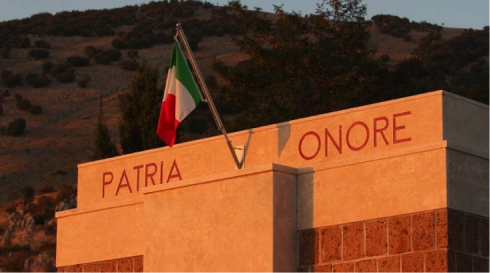Rodolfo Graziani from the Encyclopaedia Aethiopica
Leave a commentNovember 16, 2012 by neverforgetcampaign

The disputed Graziani Mausoleum in Affile, August 2012
Graziani (b. 11 August 1882, Filettino, d. 11 January 1955, Rome) was an Italian officer who played a leading role in the Italian expeditions to Libya, Italian Somaliland and Ethiopia. He also took part in World War II, when Mussolini planned to invade Egypt to renew the “glory” of the ancient Roman Empire.
He entered the army in 1904 and had a rapid career. In 1908 he was dispatched to Eritrea as commander of the 1st Battaglione Indigeni at cAddi Wǝgri (Mändäfära). He was back to Italy in 1912; in the next year, when he married Ines Chionetti, he already was a captain. During World War I, at the age of 36 he became the youngest colonel of the Italian army of the time.
As an officer, Graziani was notorious for his brutality and toughness. In 1930 he was appointed by Mussolini as deputy to General Badoglio in Barka, Libya. There he succeeded in nearly eradicating the colony. Many inhabitants were killed or sent to prisons. Graziani created special courts, the tribunali volanti, which gained him the local appellation of “butcher of the Arabs”. There Libyan opponents were condemned, with great dispatch, and sentences were executed publicly. Wells were blocked with cement and many of his opponents were thrown from planes and crashed to their deaths.
In February 1935 Graziani was appointed governor-general of Italian Somaliland and commander of the expeditionary force, in preparation for the invasion of Ethiopia, ordered by Mussolini in October 1935. Aiming less at the defeat than the total annihilation of the enemy, during the Italian War 1935-36 Graziani deployed the most deadly weapons, including gas, banned by international law. He was likewise proud to have under his command the Libya Division, known for not taking any prisoners.
Graziani reached Addis Abäba in May 1936, and was then appointed Marshal of the Italian army and Viceroy of Ethiopia. In the latter capacity, at the end of the war, he also ordered the elimination of the remains of the imperial army; and implemented a wide range of suppressive measures, especially against the local nobility. As a reaction he became the target of an assassination attempt (followed by the Graziani massacre). On 6 October 1937 he was removed from Ethiopia and granted the title of Marchese di Neghellì.
Upon the launch of World War II, Graziani was re-appointed general commander of the Italian army in Libya. After the war Graziani was sentenced by an Italian jury to 19 years imprisonment for collaborationism, but he was released shortly after in 1950. During his last years he participated actively in the re-establishment of Fascism with the neo-Fascist party Movimento Sociale Italiano. Graziani wrote a number of books glorifying his victories and the fascist ideology.
Source: RODOLFO GRAZIANI, Il fronte sud: con prefazione del Duce, Milano, 1938; ID., Africa settentrionale, 1940-41, Roma 1948; ID., Pace Romana in Libia, Milano 1934; ID., Una vita per l’Italia: “ho difeso la patria”: con un inedito diario dei giorni della prigionia, Milano 1998; documents in the Archivio di Stato, Roma; ISIAO, Roma; Italian Foreign Ministry’s archives; Libyan Centre for the Study of the Libyan Struggle against Italian Occupation.
Literature: PIERO BARONI, Generali nella polvere: perché abbia-mo perduto in Africa settentrionale (giugno 1940-febbraio 1941), Gardolo di Trento ca. 1989; GIUSEPPE BEDENDO, Le gesta e la politica del generale Graziani, Roma 1936; ANGELO DEL BOCA, “Graziani, Rodolfo”, in: Dizionario biografico degli Italiani, vol. 58, Roma 2002, 829-35 (Lit.); FEDERICO CHABOD, A History of Italian Fascism, London 1963; LUDWIG SCHAEFER, The Ethiopian Crisis: Touchstone of Appeasement?, Boston 1961, 38-55; SANDRO SANDRI, Il generale Rodolfo Graziani, Roma n.d.
Shawki El Gamal (Encyclopaedia Aethiopica)
